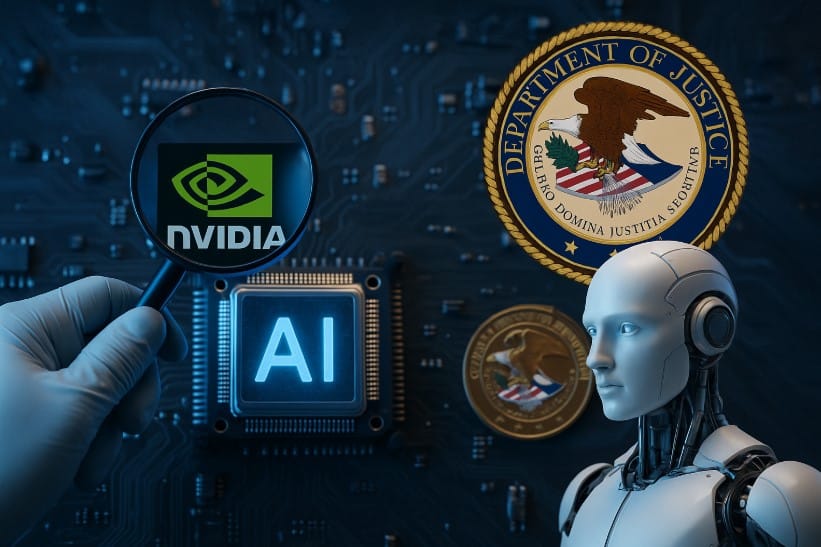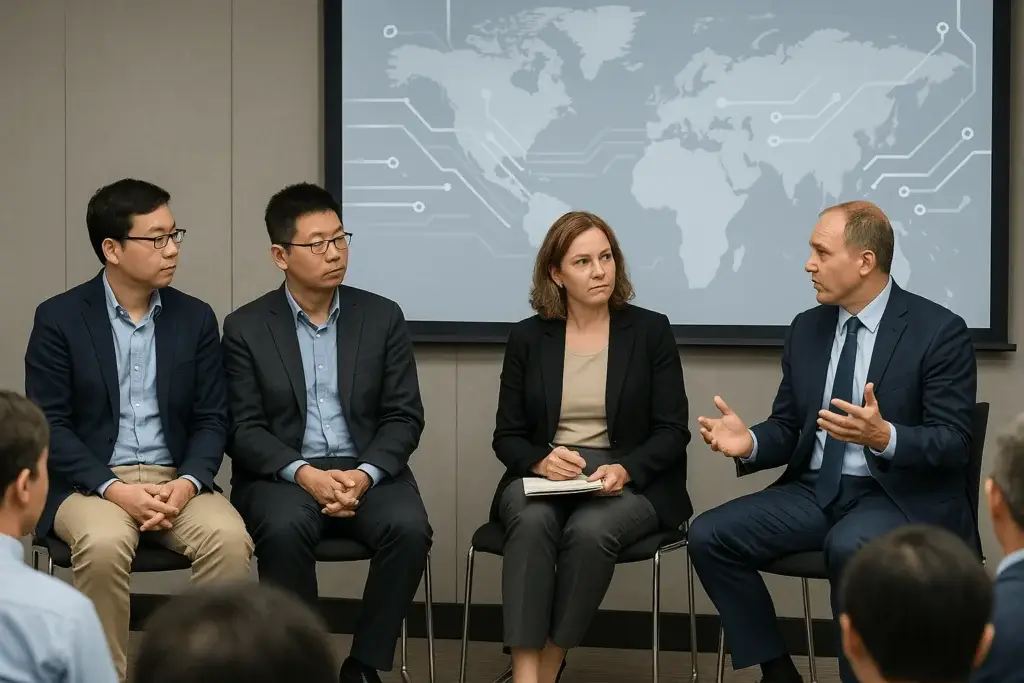Now Reading: NVIDIA Under Fire: The Future of AI Technology And What the DOJ Investigation Is About
- 01
NVIDIA Under Fire: The Future of AI Technology And What the DOJ Investigation Is About

NVIDIA Under Fire: The Future of AI Technology And What the DOJ Investigation Is About
The DOJ is investigating NVIDIA’s grip on AI chips, raising big questions about tech monopolies and the future of AI technology. Find out what this means and why you should care.
A Giant Under Scrutiny
Picture this: you’re building a smart robot, training it to recognize faces, drive a car, or even write poetry. What do you need? A whole lot of processing power. And chances are, if you’re anywhere in the AI space, you’re turning to NVIDIA, the company that’s become the go-to name for high-performance AI-chips.
But now, the tech giant is facing some serious heat.
The U.S. Department of Justice (DOJ) has reportedly launched an investigation into NVIDIA’s business practices. The concern? That NVIDIA might be flexing its dominance muscles in the AI chip market a bit too hard, potentially violating antitrust laws by making it difficult for smaller players to compete. The story was first reported by The Wall Street Journal and has been spreading fast across tech and finance circles.
Let’s be real here, monopoly investigations aren’t new in the tech world. We’ve seen Apple, Google, and Amazon all get grilled over the years. But this one hits differently, because it’s not just about market control, it’s about the very foundation of the future of AI technology.
NVIDIA’s chips are the brains behind most AI systems today. From ChatGPT to autonomous cars, their hardware powers innovation. So, if there’s even a hint of shady behavior like locking out competitors or stacking the deck, that could impact the direction AI is heading for everyone.
Now, to be clear: nothing is proven yet. The DOJ is still gathering facts, and NVIDIA hasn’t been formally accused of wrongdoing as at the time of this post. But it’s a reminder that with great power and profit margins comes great scrutiny.
So why does this matter to you and me? Because the tools and tech that shape our daily lives—and jobs, could be influenced by what happens next.
How NVIDIA Became the King of AI-Chips
You know how some people say, “right place, right time”? Well, that’s basically the story of NVIDIA, except it was also the right tech.
Back in the early 2000s, NVIDIA was mainly known for making graphics cards for gamers. Their GPUs (graphics processing units) made video games look amazing, but here’s the twist: those same GPUs turned out to be perfectly suited for AI tasks too. Why? Because they can handle thousands of tiny operations at once, exactly what AI models need when crunching massive amounts of data.
Fast-forward to today, and NVIDIA isn’t just a gaming company anymore but the backbone of the AI revolution. Their chips are behind everything from ChatGPT and Midjourney to Tesla’s self-driving systems and cloud computing platforms like Amazon Web Services. In fact, NVIDIA chips are so dominant that they make up an estimated 80% or more of the AI chip market, according to Reuters.
And that dominance didn’t happen by accident. NVIDIA was quick to recognize the future of AI and started building an entire ecosystem around their chips, including software platforms like CUDA, partnerships with big tech, and even exclusive supply deals. The result? If you’re building serious AI, chances are, you’re buying NVIDIA.
But here’s where things get a little tricky.
Competitors have been saying that it’s become nearly impossible to break in. Smaller AI chip startups and even larger companies like AMD and Intel are finding it hard to compete, not necessarily because they don’t have good tech, but because NVIDIA has already locked in the market. Some even say it feels like NVIDIA built the playground and owns all the best toys.
And that’s exactly why the DOJ is now asking questions.
Sure, it’s impressive that NVIDIA became the king of AI-chips. But with great success comes great responsibility. If their market position ends up limiting innovation or freezing out the competition, it could directly impact the pace and fairness of progress in the future of AI technology.
Because when one company controls too much of the foundation, everyone else has to build on their terms.
What the DOJ Investigation Is and Isn’t, So Far
Okay, let’s take a breath for a second. “DOJ investigation” sounds intense and it is but it’s important to understand what’s actually happening and what it could mean.
First things first: the U.S. Department of Justice (DOJ) hasn’t officially accused NVIDIA of anything yet. There are no charges, no courtroom drama (at least not yet), and no dramatic press conferences. What is happening is a preliminary look, basically the DOJ is asking questions, reviewing documents, and trying to figure out if there’s any fire behind all this AI-chip smoke.
The core concern? Whether NVIDIA is using its dominant position in the AI-chips market to block or weaken competitors unfairly. That could mean exclusive contracts, pricing deals that undercut others, or even using its software ecosystem to lock developers into their chips. All of this, if proven true, could fall under potential antitrust violations which is basically, playing too rough in the sandbox.
But until evidence is presented, this investigation is more like a fact-finding mission than a full-blown legal battle. According to The Verge, the DOJ is especially interested in whether NVIDIA’s influence could stifle innovation across the entire AI sector.
And honestly, that’s a valid question.
Because the future of AI technology depends on healthy competition. If one company gets to decide the pace, price, and direction of progress, we all lose out whether we’re building the next AI startup or just enjoying smarter tech in our daily lives.
Bottom line? This investigation isn’t about punishing success. It’s about making sure the road to innovation stays open to more than just one driver.
What This Means for the Future of AI Technology
Alright, let’s zoom out a little. This DOJ investigation into NVIDIA isn’t just a legal story, it’s a tech story. A future story. A how-we-got-here-matters kind of story. Because if you care even a little about where artificial intelligence is headed (and honestly, you should), this stuff really matters.
Right now, we’re in the middle of an AI boom. Think of it like the early days of the internet or smartphones—big, exciting, a little chaotic. Startups are launching new AI tools every week, and major players like Google, Meta, and OpenAI are racing to build the smartest models. But here’s the kicker: most of these innovations run on one brand of hardware which is the NVIDIA’s AI-chips.
When one company becomes the “go-to” for an entire industry, innovation can either skyrocket… or get stuck. And that’s the real worry here. If NVIDIA keeps tightening its grip, controlling access, pricing, and partnerships, it could slow down smaller competitors and limit the diversity of ideas entering the market.
Imagine if only one company had made smartphones for the last 15 years. No Android, no different camera features, no competing designs. Pretty stale, right?
That’s what critics fear could happen to the future of AI technology. This could mean less competition, fewer breakthroughs, and ultimately, a tech landscape shaped by business decisions, not bold new ideas.
It’s not just theory either. According to Bloomberg, NVIDIA’s dominance is already influencing how companies budget for chips, where they can build their models, and even how much AI innovation costs. And that creates a very real barrier for smaller companies that might otherwise be on the verge of something amazing.
This isn’t about making NVIDIA the villain here, it’s about protecting the open road ahead. AI should be a race, not a monopoly. The more minds, companies, and ideas we have working on this tech, the better the outcomes for everyone, from the kid building a chatbot in their bedroom to hospitals using AI for faster diagnoses.
So yeah, what happens next could shape not just one company’s future, but all of ours.
What Happens Next? And Why It Matters to All of Us
So where does all of this go from here? Short answer: it’s still unfolding. The DOJ’s investigation into NVIDIA is ongoing, and there’s no set timeline. These things can move slowly like “grab another cup of coffee and wait a few months” slow. But what comes out of it could have ripple effects across the entire tech world, especially when it comes to the future of AI technology.
If the investigation finds that NVIDIA has crossed legal lines, we might see new regulations or even some changes in how the AI-chip market works. That could open the door for smaller players to finally compete or, at the very least, level the playing field a bit. On the flip side, if nothing illegal is found, it’ll send a message that NVIDIA’s current practices are fair game, which could push competitors to find new ways to innovate or partner up.
But here’s the deal: no matter the outcome, this moment is a wake-up call.
It reminds us that behind every mind-blowing AI advancement, the ones writing essays, making art, predicting protein structures, there are real-world decisions being made about who controls the tools and who gets access to them.
And that affects everyone. Whether you’re a developer, a business owner, or just someone who likes playing with AI photo filters, the choices being made now will shape the AI experience you get five or ten years from now.
This is why tech regulation isn’t just some far-off political issue. It’s a kitchen-table issue. Because AI isn’t going away anytime soon, it’s only getting bigger, faster, and more embedded in our lives.
If you want to stay informed on how all this shakes out, check out Reuters for updates because they’ve been following this story closely.
Conclusion: Why You Should Care, And What You Can Do About It
Let’s be honest, headlines like “DOJ Investigates NVIDIA for Antitrust Violations” sound like something you’d scroll past on your way to cat memes. It feels big, corporate, and far away from everyday life. But here’s the truth: this story does matter to all of us, and especially to anyone even remotely interested in the future of tech, fairness, and innovation.
Why? Because the future of AI technology is already woven into your daily routine. From personalized playlists to Google searches, and even tools that help doctors detect illness earlier, AI is everywhere. And most of that technology? It runs on chips made by NVIDIA.
If one company controls the bulk of that infrastructure, it shapes who gets to innovate and how fast that innovation spreads. That’s not just a business issue. It’s a creativity, accessibility, and affordability issue. And if this investigation finds wrongdoing, it could spark changes that open up the space for more diversity, fairness, and opportunity in the AI world.
But even if you’re not a coder or tech CEO, there is something you can do: stay informed. Pay attention to how companies are shaping the digital world you live in. Ask questions about how your data is used, how AI tools make decisions, and who stands to gain. Even sharing articles like this DOJ investigation update from The Verge can keep the conversation alive.
Because tech doesn’t evolve in a vacuum, it evolves with public input, media attention, and community pressure. And when we all pay attention, it gets harder for any one company to quietly steer the entire ship.
So next time you see a headline about antitrust or AI-chips, don’t scroll past it. Dig in. Ask questions. Share it with a friend. This is your digital future too and it’s worth protecting. If you enjoy this piece, please leave a comment below and check out our other articles too.















